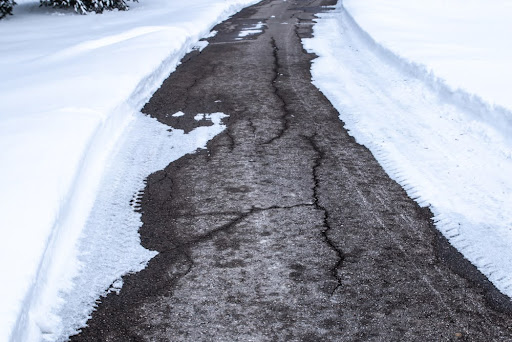- Unmasking Alligator Cracking: The Hidden Enemy of Asphalt Pavement
- Are Asphalt and Sealcoating Environmentally Friendly?
- Should I Repair My Potholes in Spring?
- 5 Important Questions You Should Ask Your Seal Coating Company
- How Does Snow Cause Potholes on Asphalt Roads?
- How Can Driveway Paving Add Value to Your Home?
- How Does Sealcoating Protect Driveways From Damage?
How Do Freeze-Thaw Cycles Affect Asphalt Pavement?

Keeping your asphalt pavement looking its best can prove challenging, especially during the winter months. In addition to the general wear and tear that happens with cars and trucks going over your paved surfaces, the elements and weather can wreak havoc on your asphalt. The asphalt surface can suffer damage from the winter weather in various ways, but the natural occurrence you need to keep in mind is the freeze-thaw cycles. But how exactly does the freeze-thaw cycle work, and why is it so potentially harmful to your pavement surface? We take a deep dive into the effects this natural phenomenon has on your pavement and what you can do to counter or limit the effects.
Breaking Down Freeze-Thaw Cycles
When you live in a colder climate, snowfall tends to be a seasonal concern that you have to deal with every year. When it comes to your asphalt pavement, as the temperatures drop and the snow begins to fall, the total accumulation won't be what damages the asphalt mix — it's the resulting water after it melts. As the snow melts as the temperature rises, the water seeps into the ground beneath your asphalt and works its way into the cracks between your parking lot's asphalt. If the temperature is still cold enough, the water within the cracks will freeze and produce a substantial ground heave during the process, which can cause your blacktop to shift. The heave can make cracks worsen, causing them to expand exponentially and eventually become a sizable — and unsightly — pothole. Residential and commercial properties have a potentially tricky time extending the life cycle of their asphalt surfaces when they don't correctly address their growing pothole problem. Thankfully, you have some options to help with your residential sealcoating needs.
Adequate Drainage
The best way to protect your driveway or paved surfaces from the winter elements starts at the beginning when you begin laying the paving materials. Since the significant dangers of the freeze-thaw cycle come from the water pooling and worsening the cracks within your pavement, installing your blacktop to drain properly helps keep the water from pooling in the worst possible spots and can ensure that your pavement will be protected in the future. However, if you're not dealing with an active asphalt paving job site with freshly installed asphalt mix, you can still protect your pavement.
Use Crack Fillers
Even with the best drainage, your asphalt binders will wear down over time, and cracks will most likely form. Instead of tearing your paved surfaces out and laying out a new asphalt system, you can use materials like crack fillers as a means of preventative maintenance to help address the problem. You can apply an acrylic or hot rubberized crack filler into the cracks to help limit and seal the number of places the water can seep into over the freeze-thaw cycle. However, it’s worth noting that if your blacktop is not structurally sound, it would need to be cut and patched, and in some cases, even repaved entirely.
Regular Sealcoating Provides the Best Protection
Sealcoating provides the best protection from water infiltration and the long-lasting effects of the freeze-thaw cycle for residential and commercial paved surfaces. Commercial sealcoating involves applying a protective layer to your surface, cracks included, that prevents water from soaking through where it can do the most damage. Resealing your surfaces every three to five years helps provide the best level of protection for your asphalt. Structurally sound driveways can benefit from properly timed sealcoating applications and significantly reduce how often you have to completely replace your asphalt. Plus, having a smoother black driveway will absorb rays from the sun, making it easier to clear any ice and snow. Additionally, throughout the winter, you can use a variety of chemicals and "deicing" products that are designed to limit the slippery surfaces you have to deal with during the winter. However, the continued use of these types of products can further oxidize your blacktop and make it more susceptible to water damage. Sealcoating your driveway can help minimize the exposure to these chemicals and continue to protect your surfaces.
Hire the Professionals to Protect Your Asphalt!
The freeze-thaw cycle can potentially cause a world of problems for homeowners and property owners alike. Protecting your asphalt requires taking a detailed and consistent approach to caring for your asphalt. Superior Seal Coating has the reputation and expertise to properly sealcoat your pavement surfaces throughout Montgomery County, PA, and the surrounding areas, and protect them from the freeze-thaw cycle fallout. Contact our team to schedule your next sealcoating appointment today!